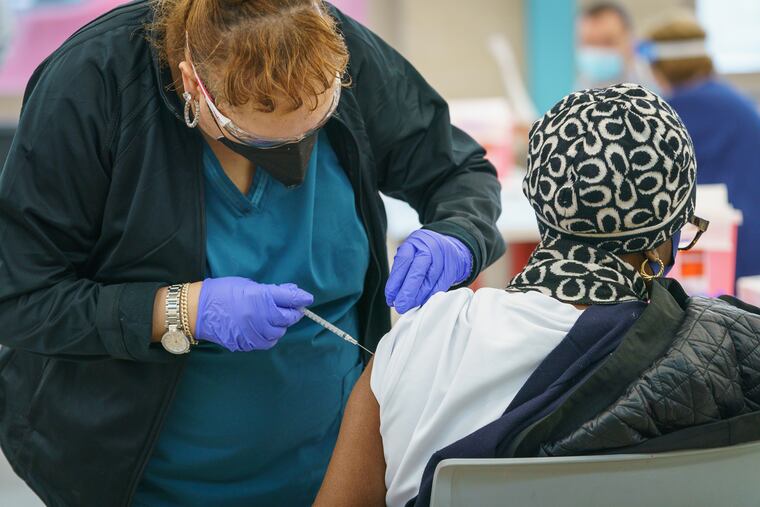Lifesaving vaccines should be free | Expert Opinion
Why do we make it difficult for our most vulnerable adults to get recommended vaccines?

The Centers for Disease Control and Prevention has urged everyone 6 months and older to receive at least one dose of the latest versions of the COVID-19 vaccine that were approved recently by the Food and Drug Administration. As a doctor who specializes in public health and delivering vaccines to adults, I listened to the relevant presentations from the CDC, and I agree with its recommendations, especially in light of the recent gradual rise in the number of COVID cases and hospitalizations. I got my COVID and flu shots this month.
Now it’s crucial that the American people — especially those who are at highest risk because of older age or underlying medical conditions — follow the CDC’s advice.
This will be a challenge, given that most people now have to rely on their health insurance to pay for the vaccines, which cost more than $100 out of pocket.
In May, the federal government ended its public health emergency. Previously, that designation had ensured that all COVID-19 vaccines were available at no cost, even to those without health insurance.
During the state of emergency, the federal government purchased all COVID-19 vaccines and paid providers to administer them. Now that the system has shifted to the private commercial market, the 25 million to 30 million adults who lack health insurance — along with those whose insurance won’t cover vaccines in whole or in part — will have more difficulty accessing these lifesaving vaccines.
Not surprisingly, the initial rollout of the new vaccine has been complicated by insurance coverage delays, along with problems shipping the vaccine to providers.
Watching this unfold — and comparing it with the relatively seamless system during the public health emergency — has made me angry. Why do we make it difficult for our most vulnerable adults to get recommended vaccines? Ensuring seamless access would save lives.
Watching this unfold has made me angry.
When faced with a public health threat such as a pandemic, the government knows how to react: pay for lifesaving vaccines to remove the cost barriers, and ensure access to any provider certified to give the vaccine. So why doesn’t it do that for other vaccines that are recommended for other deadly diseases?
Such a program exists for children. The federal Vaccines for Children Program provides doctors’ offices with free vaccines for children who are uninsured, or whose insurance won’t cover the costs. Signed into law 30 years ago, the Vaccines for Children Program has avoided an estimated 427 million vaccine-preventable illnesses and averted over a million premature deaths. It’s a remarkable achievement.
Why don’t we do the same thing for adults? Lifesaving vaccines should be free, and our country needs a federal Vaccines for Adults Program.
» READ MORE: New COVID-19 booster is a ‘leap of faith.’ I’m taking it — just not yet. | Opinion
COVID-19 is not the only deadly infectious threat we face, and the CDC has recommended that adults, depending on their age, get vaccines against potentially deadly illnesses such as the flu, hepatitis B, shingles, tetanus, respiratory syncytial virus (RSV), and human papillomavirus (HPV). The flu alone kills thousands of Americans every year.
Yet we have no government program to cover vaccine costs for adults with no — or inadequate — insurance.
No surprise, adult vaccination rates of the CDC-recommended vaccines are far below those of childhood vaccines. In Pennsylvania and New Jersey, as well as nationwide, less than 50% of adults are up-to-date on their vaccinations.
This is most likely to do with other reasons besides lack of insurance, including vaccine hesitancy and misinformation about vaccines. Even with the government paying for COVID-19 vaccines during the public health emergency, too many people opted out.
The federal government has created the Bridge Access Program, a temporary measure that covers the cost of the COVID-19 vaccines for adults who are uninsured, or whose insurance won’t cover all costs associated with the vaccine. But it’s only for COVID-19 and is set to expire in December 2024.
Experts in public health have been advocating for a Vaccines for Adults Program for many years. This advocacy coalesced in 2015 in the Adult Vaccine Access Coalition, with the mission to “strengthen and enhance access to and increase utilization of vaccines among adults.”
But we need to do more.
The establishment of a Vaccines for Adults Program would be a huge step in removing barriers to improving adult immunization rates, especially for our most vulnerable.
Everyone with an interest in reducing the incidence of vaccine-preventable diseases among adults should contact their congressional representatives to encourage such a program. Your life — and the lives of people you care about — may depend on it.
Eddy Bresnitz is a physician and former deputy commissioner for public health services in the New Jersey Department of Health, where he was also the state’s chief epidemiologist. From 2008 to 2020, he was the global medical director for adult vaccines at Merck, during which time Merck’s position was to be neutral on state mandates. He retired from Merck several years ago and no longer owns individual stocks in the company. dreddybres@gmail.com